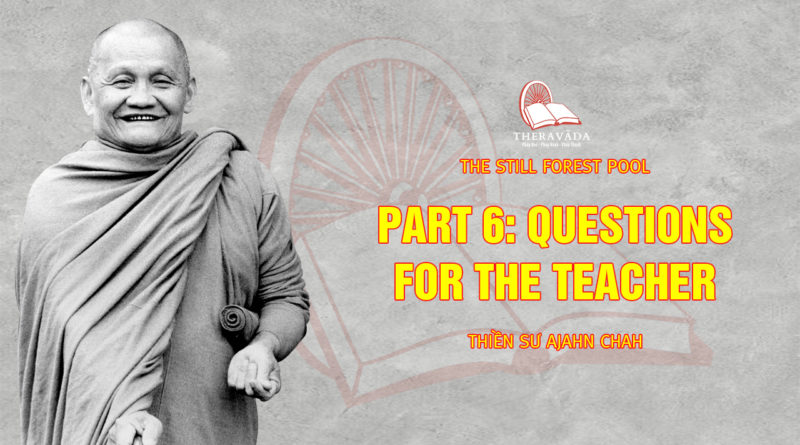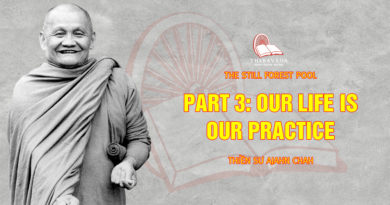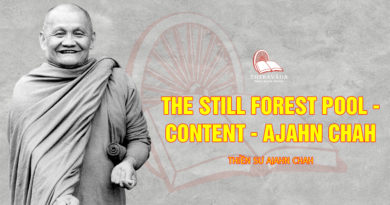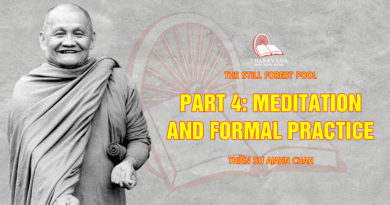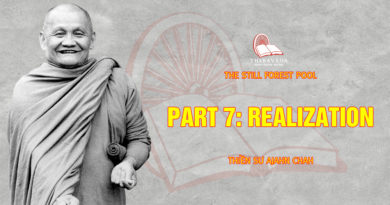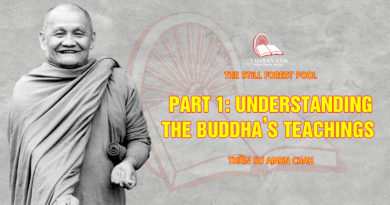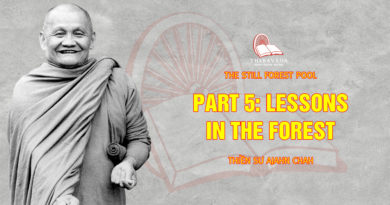PART 6
Questions for the Teacher
One of the most delightful ways to receive instruction from Achaan Chah is to sit at his cottage and listen as he answers questions for the monks of the monastery and the constant stream of lay visitors. It is here that one can see the universality of this way of practice, for although on some days he might discuss only the rice crop with a local farmer, most of the questions one hears are the same from Asians and Westerners alike. They ask about doubts and fears, the ways to calm the heart, the possibilities and struggles in living a virtuous and meditative life.
One or two hundred or more European and American students have found their way to the rural forest of Thailand to practice at Wat Ba Pong and its branch monasteries over the years. They include seekers and travelers, physicians and Peace Corps volunteers, old and young. Some have come to ordain for good and make the monk’s path their way of life. Others stay for shorter periods of training and then return to the West to integrate and apply the way of mindfulness to their household life.
Some of the questions which follow were asked during the 1970 rains retreat by monks, both Western and Thai. Others came from a more recent session during a visit by Western lay students and Dharma teachers to WatBa Pong. If you listen carefully to the answers to these questions, you will find each points to a way of practice and freedom you can use in your own life. Each contains the seeds of the Dharma of liberation, and each points you back to the source of true insight and understanding-your own heart and mind.
Questions and Answers
One part of these questions, answers, and discussions with Achaan Chah was recorded during the visit of a group of Western disciples and Dharma teachers to Wat Ba Pong. Included also are parts of the questions and answers from Living Buddhist Masters, gathered at an earlier period during the 1970 rains retreat at Wat Ba Pong monastery.
Q: How should we start our practice? Must we begin practice with strong faith?
A: Many people start out with little faith and little understanding. This is quite natural. We all must start where we are. What matters is that those who practice must be willing to look into their own mind, their own circumstances, to learn about themselves directly. Then faith and understanding will mature in their hearts.
Q: I’m trying very hard in my practice, but I don’t seem to be getting anywhere.
A: Don’t try to get anywhere in practice. The very desire to be free or to be enlightened will be the desire that prevents your freedom. You can try as hard as you wish, practice ardently night and day, but if you still have the desire to achieve, you will never find peace. The energy from this desire will cause doubt and restlessness. No matter how long or how hard you practice, wisdom will not arise from desire. Simply let go. Watch the mind and body mindfully, but don’t try to achieve anything. Otherwise, when you are beginning to practice meditation and your heart starts to quiet down, you will immediately think, “Oh, am I near the first stage yet? How much further do I have to go?” In that instant, you will lose everything. It is best just to observe how practice naturally develops.
You have to pay attention without any concept of levels, simply and directly to what’s happening in your heart or mind. The more you watch, the more clearly you’ll see. If you learn to pay attention totally, then you don’t have to worry about what stage you have attained; just continue in the right direction, and things will unfold for you naturally.
How can I speak of the essence of practice? To walk forward is not correct, to back up is not correct, and to stand still is not correct. There is no way to measure or categorize liberation.
Q: But aren’t we seeking deeper concentration in practice?
A: In sitting practice, if your heart becomes quiet and concentrated, that’s an important tool to use. But you have to be careful not to be stuck in tranquility. If you’re sitting just to get concentrated so you can feel happy and pleasant, you’re wasting your time. The practice is to sit and let your heart become still and concentrated and then to use that concentration to examine the nature of the mind and body. Otherwise, if you simply make the heart mind quiet, it will be peaceful and free of defilement only as long as you sit. This is like using a stone to cover a garbage pit; when you take away the stone, the pit is still infested and full of garbage. The question is not how long or short you sit. You must use your concentration not to temporarily get lost in bliss but to deeply examine the nature of the mind and body. This is what actually frees you.
Examining the mind and body most directly does not involve the use of thought. There are two levels of examination. One is thoughtful and discursive, keeping you trapped in a superficial perception of experience. The other is a silent, concentrated, inner listening. Only when the heart is concentrated and still can real wisdom naturally arise. In the beginning, wisdom is a very soft voice, a tender young plant just beginning to spring up out of the ground. If you don’t understand this, you may think too much about it and trample it underfoot. But if you feel it silently, then in that space, you can begin to sense the basic nature of your body and mental process. It is this seeing that leads you to learn about change, about emptiness, and about selflessness of body and mind.
Q: But if we are not seeking anything, then what is the Dharma?
A: Everywhere you look is the Dharma; constructing a building, walking down the road, sitting in the bathroom, or here in the meditation hall, all of this is Dharma. When you understand correctly, there is nothing in the world that is not Dharma.
But you must understand. Happiness and unhappiness, pleasure and pain are always with us. When you understand their nature, the Buddha and the Dharma are right there. When you can see clearly, each moment of experience is the Dharma. But most people react blindly to anything pleasant, “Oh, I like this, I want more,” and to anything unpleasant, “Go away, I don’t like this, I don’t want any more.” If, instead, you can allow yourself to open fully to the nature of each experience in the simplest way, you will become one with the Buddha.
It’s so simple and direct once you understand. When pleasant things arise, understand that they’re empty. When unpleasant things arise, understand that they’re not you, not yours; they pass away. If you don’t relate to phenomena as being you or see yourself as their owner, the mind comes into balance. This balance is the correct path, the correct teaching of the Buddha which leads to liberation. Often people get so excited-“Can I attain this or that level of samadhi?” or ‘What powers can I develop?” They completely skip over the Buddha’s teaching to some other realm that’s not really useful. The Buddha is to be found in the simplest things in front of you, if you’re willing to look. And the essence of this balance is the no grasping mind.
When you begin to practice, it’s important to have a proper sense of direction. Instead of just trying to which way to go and wandering around in circles, you must consult a map or someone who’s been there before in order to establish a sense of the path. The way to liberation first taught by the Buddha was The Middle Path lying between the extremes
of indulgence in desire and self-mortification. The mind must be open to all experience without losing its balance and falling into these extremes. This allows you to see things without reacting and grabbing or pushing away.
When you understand this balance, then the path becomes clear. As you grow in understanding, when things come that are pleasant, you will realize that they won’t last, that they’re empty, that they offer you no security. Unpleasant things will also present no problem because you will see that they won’t last either, that they’re equally empty. Finally, as you travel further along the path, you will come to see that nothing in the world has any essential value. There’s nothing to hold on to. Everything is like an old banana peel or a coconut husk-you have no use for it, no fascination with it. When you see that things in the world are like banana peels that have no great value for you, then you’re free to walk in the world without being bothered or hurt in any way. This is the path that brings you to freedom.
Q: Do you recommend that students do long, intensive, silent retreats?
A: It’s largely an individual matter. You must learn to practice in all kinds of situations, both in the marketplace and when you’re really alone. Yet to start where it’s quiet is helpful; that’s one reason we live in the forest. In the beginning you do things slowly, working to become mindful. After a time you can learn to be mindful in any situation.
Some people have asked about doing six months or a year of silent, intensive practice. For this there can be no rule; it has to be determined individually. It’s like the ox carts that the villagers use around here. If the driver is going to carry a load to some town, he has to assess the strength of the cart, the wheels, and the oxen. Can they make it, or can’t they? In the same way, the teacher and the student must be sensitive both to possibilities and to limitations. Is the student ready for this sort of practice? Is this the right time? Be sensitive and sensible; know and respect your own limits. This is also wisdom.
Buddha talked about two styles of practice: liberation through wisdom and liberation through concentration. People whose style is liberation through wisdom hear the Dharma and immediately begin to understand it. Since the entire teaching is simply to let go of things, to let things be, they begin the practice of letting go in a very natural way, without a great deal of effort or concentration. This simple practice can take them eventually to that place beyond ;’If where there is no more letting go and no one to hold on.
Some people, on the other hand, depending on their background, need a lot more concentration. They have to sit and practice in a very disciplined way over a long period of time. For them, this concentration, if it is used properly, becomes the basis for deep, penetrating insight. Once the mind is concentrated, it’s like having finished high school-you can now go on to college and study any number of things. Once samadhi is strong, you can enter the different planes of absorption, or you can experience all the levels of insight, depending on how you choose to use it.
In either case, liberation through wisdom and liberation through concentration must arrive at the same freedom in practice. Any of the tools of our practice applied without attachment can bring us to liberation. Even the precepts-whether the five precepts for householders, the ten precepts for novices, or the 227 precepts for monks-can be used in the same way. Because these are disciplines that require mindfulness and surrender, there is no limit to their usefulness. For example, if you keep refining just the basic precept of being honest, applying it to your outer actions and inner contemplation, it has no limit. Like any other Dharma tool, it can set you free.
Q: Is it useful to do loving kindness meditation as a separate part of practice?
A: Repeating words of loving kindness can be useful, but this is a rather elementary practice. When you have really looked into your own mind and done the essential Buddhist practice correctly, you will understand that true love appears. When you let go of self and other, then there is a deep, natural development that is different from the child’s play of repeating the formula, “May all beings be happy; may all beings not suffer.”
Q: Where should we go to study the Dharma?
A: If you look for the Dharma, you will find that it has nothing to do with the forests, the mountains, or the caves-it exists only in the heart. The language of the Dharma isn’t English or Thai or Sanskrit. It has its own language, which is the same for all people-the language of experience. There is a great difference between concepts and direct experience. Whoever puts a finger into a glass of hot water will have the same experience of hot, but it is called by many words in different languages. Similarly, whoever looks deeply into the heart will have the same experience, no matter what his or her nationality or culture or language. If in your heart you come to that taste of Dharma, you become one with others, like joining a big family.
Q: Then is Buddhism much different from other religions?
A: It is the business of genuine religions, including Buddhism, to bring people to the happiness that comes from clearly and honestly seeing how things are. Whenever any religion or system or practice accomplishes this, you can call that Buddhism, if you like.
In the Christian religion, for example, one of the most important holidays is Christmas. A group of the Western monks decided last year to make a special day of Christmas, with a ceremony of gift-giving and merit-making. Various other disciples of mine questioned this, saying, “If they’re ordained as Buddhists, how can they celebrate Christmas? Isn’t this a Christian holiday?”
In my Dharma talk, I explained how all people in the world are fundamentally the same. Calling them Europeans, Americans, or Thais just indicates where they were born or the color of their hair, but they all have basically the same kind of minds and bodies; all belong to the same family of people being born, growing old, and dying. When you understand this, differences become unimportant. Similarly, if Christmas is an occasion where people make a particular effort to do what is good and kind and helpful to others in some way, that’s important and wonderful, no matter what system you use to describe it.
So I told the villagers, ‘Today we’ll call this Chrisbuddhamas. As long as people are practicing properly, they’re practicing Christ-Buddhism, and things are
I teach this way to enable people to let go of their attachments to various concepts and to see what is happening in a straightforward and natural way. Anything that inspires us to see what is true and do what is good is proper practice. You may call it anything you like.
Q: Do you think that the minds of Asians and Westerners are different?
A: Basically, there is no difference. Outer customs and language may appear different, but the human mind has natural characteristics that are the same for all people. Greed and hatred are the same in an Eastern or a Western mind. Suffering and the cessation of suffering are the same for all people.
Q: Is it advisable to read a lot or to study the scriptures as a part of practice?
A: The Dharma of the Buddha is not found in books. If you want to really see for yourself what the Buddha was talking about, you don’t need to bother with books. Watch your own mind. Examine to see how feelings and thoughts come and go. Don’t be attached to anything, just be mindful of whatever there is to see. This is the way to the truths of the Buddha. Be natural. Everything you do in your life here is a chance to practice. It is all Dharma. When you do your chores, try to be mindful. If you are emptying a spittoon or cleaning a toilet, don’t feel you are doing it as a favor for anyone else. There is Dharma in emptying spittoons. Don’t feel you are practicing only when sitting still, cross-legged. Some of you have complained that there is not enough time to meditate. Is there enough time to breathe? This is your meditation: mindfulness, naturalness, in whatever you do.
Q: Why don’t we have daily interviews with the teacher?
A: If you have questions, you’re welcome to come and ask them any time. But we don’t need daily interviews here. If I answer your every little question, you will never understand the process of doubt in your own mind. It is essential that you learn to examine yourself, to interview yourself. Listen carefully to the lecture every few days, then use this teaching to compare with your own practice. Is it the same? Is it different? Do you have doubts? Who is it that doubts? Only through self-examination can you understand.
Q: What can I do about doubts? Some days I’m plagued with doubts about the practice or my own progress or the teacher.
A: Doubting is natural. Everyone starts with doubts. You can learn a great deal from them. What is important is that you don’t identify with your doubts. That is, don’t get caught up in them, letting your mind spin in endless circles. Instead, watch the whole process of doubting, of wondering. See who it is that doubts. See how doubts come and go. Then you will no longer be victimized by your doubts. You will step outside of them, and your mind will be quiet. You can see how all things come and go. Just let go of what you’re attached to. Let go of your doubts and simply watch. This is how to end doubting.
Q: What about other methods of practice? These days, there seem to be so many teachers and so many different systems of meditation that it’s confusing.
A: It’s like going into town. One can approach from the north, from the southeast, from many roads. Often these systems just differ outwardly. Whether you walk one way or another, fast or slow, if you are mindful, it’s all the same. There’s one essential point that all good practice must eventually come to-not clinging. In the end, you must let go of all meditation systems. Nor can you cling to the teacher. If a system leads to relinquishment, to not clinging, then it is correct practice.
You may wish to travel, to visit other teachers and try other systems. Some of you have already done so. This is a natural desire. You will find out that a thousand questions asked and knowledge of many systems will not bring you to the truth. Eventually you will get bored. You will see that only by stopping and examining your own heart can you find out what the Buddha talked about. No need to go searching outside yourself. Eventually, you must return to face your own true nature. Right where you are is where you can understand the Dharma.
Q: Often it seems that many monks here are not practicing. They look sloppy or unmindful, and this disturbs me.
A: Seeing other monks behaving badly, you get annoyed and suffer unnecessarily, thinking, “He is not as strict as I am. They are not serious mediators like us. They are not good monks.”
Trying to get everyone to act as you wish them to act will only make you suffer. No one can practice for you, nor can you practice for anyone else. Watching other people will not help your practice; watching other people will not develop wisdom. It is a great defilement on your part.
Don’t make comparisons. Don’t discriminate. Discrimination is dangerous, like a road with a very sharp curve. If we think others are worse than, better than, or the same as we are, we spin off the road. If we discriminate, we will only suffer. It is not for you to judge whether others’ discipline is bad or they are good monks. The discipline of monks is a tool to use for your own meditation, not a weapon for criticizing or finding fault.
Let go of your opinions and watch yourself. This is our Dharma. If you’re annoyed, watch the annoyance in your own mind. Just be mindful of your own actions; simply examine yourself and your feelings. Then you will understand. This is the way to practice.
Q: I have been extremely careful to practice sense restraint. I always keep my eyes lowered and am mindful of every little action I do. When eating, for example, I take a long time find try to see each step chewing, tasting, swallowing, and so on-and I take each step deliberately and carefully. Am I practicing properly?
A: Sense restraint is proper practice. We should be mindful of it throughout the day. But don’t overdo it. Walk, eat, and act naturally, and then develop natural mindfulness of what is going on within yourself. To force your meditation or force yourself into awkward patterns is another form of craving. Patience and endurance are necessary. If you act naturally and are mindful, wisdom will come naturally.
Q: Then what is your advice to new practitioners?
A: The same as for old practitioners! Keep at it.
Q: I can observe anger and work with greed, but how does one observe delusion?
A: You’re riding a horse and asking ‘Where’s the horse?” Pay attention.
Q: What about sleep? How much should I sleep?
A: Don’t ask me, I can’t tell you. What’s important, though, is that you watch and know yourself. If you try to go with too little sleep, the body will feel uncomfortable, and mindfulness will be difficult to sustain. Too much sleep, on the other hand, leads to a dull or restless mind. Find the natural balance for yourself. Carefully watch the mind and body, and keep track of sleep needs until you find the optimum. To wake up and then roll over for a snooze is defilement. Establish mindfulness as soon as your eyes open.
As for sleepiness, there are many ways to overcome it. If you are sitting in the dark, move to a lighted place. Open your eyes. Get up and wash or slap your face, or take a bath. If you are sleepy, change postures. Walk a lot. Walk backwards. The fear of running into things will keep you awake. If this fails, stand still, clear the mind, and imagine it’s broad daylight. Or sit on the edge of a high cliff or deep well. You won’t dare sleep! If nothing works, then just go to sleep. Lie down carefully, and try to be aware until the moment you fall asleep. Then as soon as you awaken, get right up.
Q: How about eating? What is the proper amount to eat?
A: Eating is the same as sleeping. You must know yourself. Food must be consumed to meet bodily needs. Look at your food as medicine. Are you eating so much that you feel sleepy after the meal and are getting fatter every day? Try to eat less. Examine your own body and mind, and as soon as five more spoonfuls will make you full, stop and take water until just properly full. Go and sit. Watch your sleepiness and hunger. You must learn to balance your eating. As your practice deepens, you will naturally feel more energetic and eat less. But you must adjust yourself.
Q: Is it necessary to sit for very long periods of time?
A: No, sitting for hours on end is not necessary. Some people think that the longer you can sit, the wiser you must be. I have seen chickens sit on their nests for days on end. Wisdom comes from being mindful in all postures. Your practice should begin as soon as you awaken in the morning and should continue until you fall asleep. Don’t be concerned about how long you can sit. What’s important is only that you keep watchful, whether you’re walking or sitting or going to the bathroom.
Each person has his own natural pace. Some of you will die at age fifty, some at age sixty-five, and some at age ninety. So, too, your practices will not be identical. Don’t think or worry about this. Try to be mindful, and let things take their natural course. Then your mind will become still in any surroundings, like a clear forest pool. All kinds of wonderful, rare animals will come to drink at the pool, and you will clearly see the nature of all things. You will see many strange and wonderful things come and go, but you will be still. This is the happiness of the Buddha.
Q: I still have many thoughts, and my mind wanders a lot, even though I’m trying to be mindful.
A: Don’t worry about this. Just try to keep your mind in the present. Whatever arises in the mind, just watch it and let go of it. Don’t even wish to be rid of thoughts. Then the mind will return to its natural state. No discriminating between good and bad, hot and cold, fast and slow. No me and no you, no self at all-just what there is. When you walk there is no need to do anything special. Simply walk and see what is there. No need to cling to isolation or seclusion. Wherever you are, know yourself by being natural and watching. If doubts arise, watch them come and go. It’s very simple. Hold on to nothing.
It’s as though you are walking down a road. Periodically you will run into obstacles. When you meet defilements, just see them and overcome them by letting them go. Don’t think about the obstacles you’ve already passed; don’t worry about those you have not yet seen. Stick to the present. Don’t be concerned about the length of the road or the destination. Everything is changing. Whatever you pass, don’t cling to it. Eventually the mind will reach its natural balance where practice is automatic. All things will come and go of themselves.
Q: What about specific hindrances which are difficult? For example, how can we overcome lust in our practice? Sometimes I feel as if I’m a slave to my sexual desire.
A: Lust should be balanced by contemplation of loathsomeness. Attachment to bodily form is one extreme, and one should keep the opposite in mind. Examine the body as a corpse and see the process of decay, or think of the parts of the body, such as lungs, spleen, fat, feces, and so forth. Remembering these and visualizing the loathsome aspects of the body will free you from lust.
Q: How about anger? What should I do when I feel anger arising?
A: You can just let go of it, or else learn to use loving-kindness. When angry states of mind arise strongly, balance them by developing feelings of loving-kindness. If someone does something bad or gets angry, don’t get angry yourself. If you do you are being more ignorant than they. Be wise. Keep compassion in mind, for that person is suffering. Fill your mind with loving-kindness as if he were a dear brother. Concentrate on the feeling of loving-kindness as a meditation subject. Spread it to all beings in the world. Only through loving-kindness is hatred overcome.
Q: Why must we do 50 much bowing?
A: Bowing is a very important outward form of the practice that should be done correctly. Bring the forehead all the way to the floor. Have elbows near the knees about three inches apart. Bow slowly, mindful of your body. It is a good remedy for our conceit. We should bow often. When you bow three times, you can keep in mind the qualities of the Buddha, the Dharma, and the Sangha, that is, the qualities of purity, radiance, and peace. We use the outward form to train ourselves, to harmonize body and mind. Don’t make the mistake of watching how others bow. If young novices are sloppy or the aged monks appear unmindful, this is not for you to judge. People can be difficult to train. Some learn fast, but others learn slowly. Judging others will only increase your pride. Watch yourself instead. Bow often; get rid of your pride.
Those who have really become harmonious with the Dharma get far beyond the outward form. Because they have gone beyond selfishness, everything they do is a way of bowing-walking, they bow; eating, they bow; defecating, they bow.
Q, What is the biggest problem for your new disciples?
A: Opinions. Views and ideas about all things, about themselves, about practice, about the teachings of the Buddha. Many of those who come here have a high rank in the community. They are wealthy merchants, college graduates, teachers, government officials. Their minds are filled with opinions about things, and they are too clever to listen to others. Those who are too clever leave after a short time; they never learn. You must get rid of your cleverness. A cup filled with dirty, stale water is useless. Only after the old water is thrown out can the cup become useful. You must empty your minds of opinions; then you will see. Our practice goes beyond cleverness and stupidity. If you think, “I am clever, I am wealthy, I am important, I understand all about Buddhism,” you cover up the truth of anatta, or non-self. All you will see is self, I, mine. But Buddhism is letting go of self-voidness, emptiness, Nirvana. If you think yourself better than others, you will only suffer.
Q: Are defilements such as greed or anger merely illusory, or are they real?
A: They are both. The defilements we call lust or greed, anger and delusion, are just outward names and appearances, just as we call a bowl large, small, or pretty. If we want a big bowl, we call this one small. We create such concepts because of our craving. Craving causes us to discriminate, while the truth is merely what is. Look at it this way. Are you a man? Yes? This is the appearance of things. But you are really only a combination of elements or a group of changing aggregates. If the mind is free it doesn’t discriminate. No big and small, no you and me,
nothing. We say anatta, or not-self, but really, in the end, there is neither atta nor anatta.
Q: Could you explain a little more about karma?
A: Karma is action. Karma is clinging. Body, speech, and mind all make karma when we cling. We create habits that can make us suffer in the future. This is the fruit of our attachment, of our past defilement.
When we were young, our parents used to get angry and discipline us because they wanted to help us. We got upset when parents and teachers criticized us, but later, we could see why. That is like karma. Suppose you were a thief before you became a monk. You stole, made others, including your parents, unhappy. Now you are a monk, but when you remember how you made others unhappy, you feel badly and suffer even today. Or if you did some act of kindness in the past and remember it today, you will be happy, and this happy state of mind is the result of past karma.
Remember, not only body but also speech and mental action can make conditions for future results. All things are conditioned by cause, both long-term and moment-to-moment. But you need not bother to think about past, present, or future; merely watch the body and mind now. You can figure out your karma for yourself if you watch your mind. Practice and you will see clearly. After long practice you will know.
Make sure, however, that you leave others to their own karma. Don’t cling to or watch others. If I take poison, I suffer; no need for you to share it with me. Take the good that your teacher offer~. Then your mind will become peaceful like the mind of your teacher.
Q: Sometimes it seems that since becoming a monk, I have increased my hardships and suffering.
A: I know that some of you have had a background of material comfort and outward freedom. By comparison, you now live an austere existence. In the practice, I often make you sit and wait for long hours, and food and climate are different from your home. . But everyone must endure some of this-the suffering that leads to the end of suffering-in order to learn.
All my disciples are like my children. I have only loving-kindness and their welfare in mind. If I appear to make you suffer, it is for your own good. When you get angry and feel sorry for yourself, it is a great opportunity to understand the mind. The Buddha called defilements our teachers. People with little education and worldly knowledge can practice easily, but I know some of you are well educated and very knowledgeable. It is as if you Westerners have a very large house to clean. When you have cleaned the house, you will have a big living space. You must be patient. Patience and endurance are essential to our practice.
When I was a young monk, I did not have it as hard as you. I knew the language and was eating my native food. Even so, some days I despaired. I wanted to disrobe or even commit suicide. This kind of suffering comes from wrong views. When you have seen the truth, though, you are freed from views and opinions. Everything becomes peaceful.
Q: I have been developing very peaceful states of mind from meditation. What should I do now?
A: This is good. Make the mind peaceful, concentrated, and use this concentration to examine the mind and body. When the heart and mind are not peaceful, you should also watch. Then you will know true peace. Why? Because you will see impermanence. Even peace must be seen as impermanent. If you are attached to peaceful states of mind, you will suffer when you do not have them. Give up everything, even peace.
Q: Did I hear you say that you’re afraid of very diligent disciples?
A: Yes, that’s right. I’m afraid that they’re too serious. They try too hard, without wisdom, pushing themselves. into unnecessary suffering. Some of you have determined to become enlightened. You grit your teeth and struggle all the time. You’re just trying too hard. You should just see that people are all the same-they don’t know the nature of things. All formations, mind and body, are impermanent. Simply watch and don’t cling.
Q: I have been meditating for many years. My mind is open and peaceful in almost all circumstances. Now I would like to try to backtrack and practice high states of concentration or mind absorption.
A: Such practices are beneficial mental exercise. If you have wisdom, you will not get hung up on concentrated states of mind. In the same way, wanting to sit for long periods is fine for training, but practice is really separate from any posture. Directly looking at the mind is wisdom. When you have examined and understood the mind, you have the wisdom to know the limitations of concentration or books. If you have practiced and have understood not clinging, you can then return to the books as to a sweet dessert, and they can also help you to teach others. Or you can return to practicing absorption-concentration with the wisdom to know not to hold on to anything.
Q: Please say more about how to share the Dharma with others.
A: To act in ways that are kind and wholesome is the most basic way to further the teaching of Buddha. To do what is good, to help other people, to work with charity and morality, brings good results, brings a cool and happy mind for yourself and others.
To teach other people is a beautiful and important responsibility that one should accept with a full heart. The way to do it properly is to understand that in teaching others you must always be teaching yourself. You have to take care of your own practice and your own purity. It’s not enough to simply tell others what’s correct. You must work with what you teach in your own heart, being unwaveringly honest with yourself and with others. Acknowledge what is pure and what is not. The essence of the Buddha’s teaching is to learn to see things truthfully, fully and clearly. Seeing the truth in itself brings freedom.
Q: Would you review some of the main points of our discussion?
A: You must examine yourself. Know who you are. Know your body and mind by simply watching. In sitting, in sleeping, in eating, know your limits. Use wisdom. The practice is not to try to achieve anything. Just be mindful of what is. Our whole meditation is to look directly at the heart / mind. You will see suffering; its cause, and its end. But you must have much patience and endurance. Gradually you will learn. The Buddha taught his disciples to stay with their teacher for at least five years.
Don’t practice too strictly. Don’t get caught up with outward form. Simply be natural and watch that. Our monk’s discipline and monastic rules are very important. They create a simple and harmonious environment. Use them well. But remember, the essence of the monk’s discipline is watching intention, examining the heart. You must have wisdom.
Watching others is bad practice. Don’t discriminate. Would you get upset at a small tree in the forest for not being tall and straight like some of the others? Don’t judge other people. There are all varieties-no need to carry the burden of wishing to change them all.
You must learn the value of giving and of devotion. Be patient; practice morality; live simply and naturally; watch the mind. This practice will lead you to unselfishness and peace.
____________________

